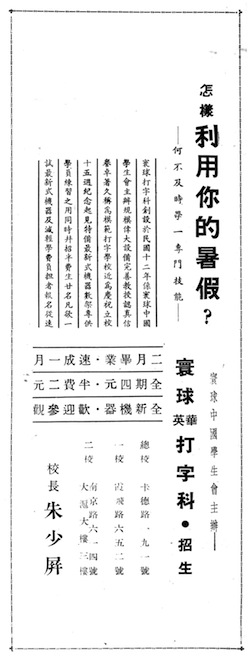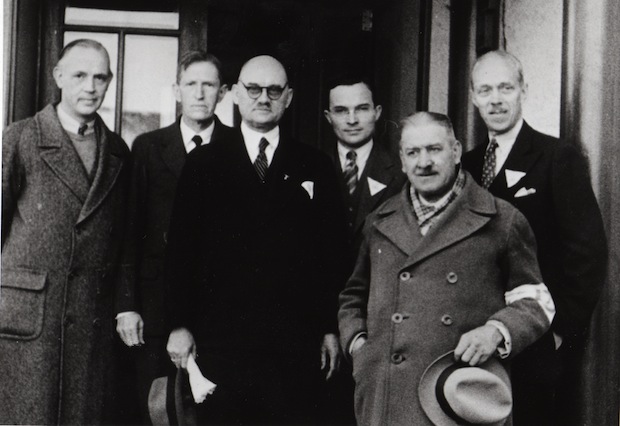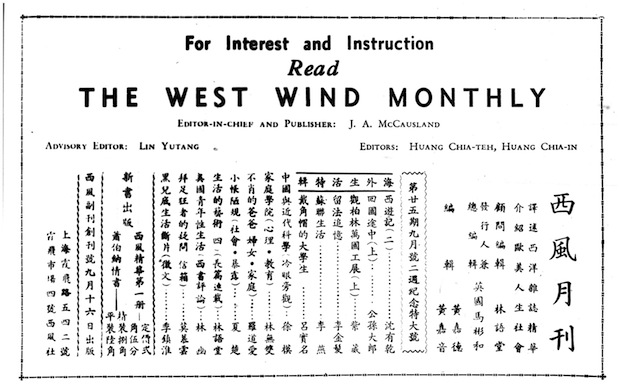FEATURES
The China Critic - 1938 | China Heritage Quarterly
The China Critic: a Chronology
William Sima
Australian Centre on China in the World
William Sima, whose research into the history and contents of The China Critic led to this combined issue of China Heritage Quarterly, has created a Chronology of the weekly. It follows the progress of The Critic from its first appearance in May 1928 through the highs and lows of the 'Nanjing Decade', and then through its various wartime permutations.
Will's Chronology, which is arranged by year below, accounts for the changing fate, and the friable editorial stance, of The Critic. It also provides numerous links to the articles under discussion allowing for them to be appreciated in an historical context.—The Editor
1928 | 1929 | 1930 | 1931 | 1932 | 1933 | 1934 | 1935 | 1936 | 1937 | 1938 | 1939 | 1940 | 1945
1938
6 January

Fig.1 'How should you make use of your summer break?' An advertisement for the Huanqiu Typewriting Polytechnic 寰球英華打字科, headed by principal P.K. Chu 朱少屏, The China Critic's business manager, 23 June
'Humor and Humanity', the first Editorial of the year, is a glowing reviewof Lin Yutang's recently published The Importance of Living. 'The past two years have seen more books on the enjoyment of life than any other period since the Great War' such as Dale Carnegie's How to Win Friends and Influence People and Stanley de Brath's How to Make the Best of Life. To the author's mind, none of these titles come close to Lin Yutang's masterpiece:
Each of these books has treated only one aspect or a few isolated problems of this inexhaustibly absorbing business of living. Such deficiencies are not apparent in Lin Yutang's masterpiece… . A number of our Chinese friends, after having read these books written by American and English authors, seem to be skeptical about the popularity and ovation given them and ask 'What do they know about this great business of living, they who have no time to explore all the finesse of life and living?'
17 February
With America and Britain not yet at war, The China Critic follows developments in Europe closely this year. It is highly critical of their respective policies of isolation and appeasement. The Editorial 'Men or Mice?' discusses recent debate in the US House of Representatives surrounding President Roosevelt's naval rearmament program. When the existence of tacit naval alliance with Britain was alleged byArthur Krock, a correspondent for The New York Times, Republican representative Ralph Brewster demanded that Krock explain his source: ' "I demand that we call Mr. Krock to a committee meeting to tell us where he gets this information that we cannot get", Mr. Brewster shouted before the Committee, "Are we mice or are we men?" ' The China Critic argues for US involvement at all costs:
The 'peace at any price' advocates are not likely to get peace, much though they may wish it, unless it be that everlasting peace that comes with death. If the little isolationists are going to scurry back into their holes every time the big cat shows his face around the corner, it is likely that even their little holes won't be able to hide them when the big bad cat brings his great big guns and blows them into eternity. And so, with Mr. Brewster, we may ask 'Are we mice or are we men?'
17 March
'Prompted' by frustration with the quality of foreign press coverage of China's war with Japan—'news and views which are not in conformity with the true situation and therefore derogatory to China's cause'—and by the recent appointment of Hollington Tong 鄧傳楷 as Deputy Director of the National government's Central Publicity Department, the editorial 'China Lacks Propaganda Abroad' discusses the need for better pro-Chinese propaganda overseas:
China's inactivity, even after the outbreak of hostilities in North China last July, in developing an international news network has been based largely on the self-assumption that China, being morally unimpeachable in the undeclared war, need not worry about favorable foreign reactions… . The international publicity situation, for China's own standpoint at least, has become such that foreign correspondents in China are not the only ones to be depended upon for news dissemination abroad and that it is all the more necessary for the Chinese themselves to exert greater efforts in presenting China's case… . We hope it would not be construed as too critical of the [Chinese] government if we were to mention that even up to the present there is no organized effort being made abroad for this purpose.
The writer of this editorial expresses hope that Hollington Tong, a man with 'proven qualifications and experience' in the area of international publicity for China's cause, will 'make up for lost ground' in this neglected area of government policy.
24 March
The headline Editorial this week, 'Carl Crow Speaks for China', comments on the recently released book I Speak for the Chinese, a concise study of Japanese policy towards China from the 'Twenty-One Demands' of 1915 to the present day. At a time when those at The China Critic believed their country was in dire need of better representation abroad, the writer of this editorial praises Crow's work as 'the most economical book on China that has ever been published, for we do not know of any other book which gives such a maximum amount of relevant information within such a minimum amount of space and time.' This editorial includes a number of quotations from Crow that exemplify Japanese aggression.
Commenting on the submersion of Austria into Germany, the Anschluß, Gordon Fan's article '"Easterkuo" Comes into Being', as its title suggests—'Austria's German name is Oesterreich, that is, the country (Reich) toward the east (Osten)'—likens Austria's recent annexation into the Third Reich to China's experience of losing Manchuria to the Japanese:
Do these utterances sound strangely familiar? Have we not heard them before? Have we not read about such 'agreements'? Certainly. All we have to do is change the proper names: for the Austrian words we substitute Manchuria, Hopei, China, Nanking, Chiang Kai-shek, the Chinese people; for the speakers' names Matsumoto, Sugiyama, Hirota, Matsui; for Berchtesgaden the Ho-Umetsu Agreement and the parallel to 1931, 1935, 1937 is complete. Germany has copied the copyists.
12 May
In his special article 'What's Wrong with China's New Culture Movement?', E.E. Liu proposes that throughout the 'long succession of national humiliations' which gave rise to the May Fourth renaissance in 1919, and in the years since, that not enough attention has been given to the Chinese masses.
Liu laments that new literature has 'failed to make a clean sweep even in the intelligent class', which is still largely comprised of 'adherents to the old school who read and write exclusively classical Chinese, worship Confucianism and scorn everything that cannot boast of a Chinese origin'—it has 'never produced any real "popular literature." ' He lauds the efforts of Hu Shih and other proponents of the vernacular baihua 白話, but contends that New Culture ran out of steam when its leaders 'deviated from the main course, split up among their own ranks and came to blows with each other.' After more than twenty years since New Culture began, Liu argues, 'the young intelligentsia of China' are still facing the same problems:
How to smash up the remaining citadels of conservatism in the intellectual circle, how to stamp out this band of mercenary and philistine writers who are now monopolizing the popular literature, and how to overcome the prejudice of the great masses of people so as to win them over to the side of a new culture and rescue them from the tightening grips of reactionaries and philistines are the problems awaiting solution.
18 August
Lewis S.C. Smythe, a sociology professor at Nanking University, contributes 'Nanking's Population in Wartime', the first of a series of articles on wartime Nanjing. Based on surveys conducted in March and April, it is claimed that these articles 'represent the first scientific attempt at assessing the damage in human life and property in the urban and rural areas of Nanking before and after the withdrawal of the Chinese defence forces.' This first installment presents a demographic survey of civilians remaining in the city—Nanjing's population fell from one million to 'between 200,000 and 250,000' by 13 December 1937, when the Japanese occupied the city under force of arms—based on research and interviews conducted in the Safety Zone and at refugee camps.
This article was followed by 'The Plight of Nanking's Wartime Population' on 25 August; 'Nanking's Building Losses', 1 September; 'Agricultural Survey in Post-War Nanking', 8 September; and 'Relief Needs in Rural Nanking', 15 September—all researched and written by S.C. Smythe.

Fig.2 The Nanking Safety Zone International Committee. From left: Ernest Forster, John Rabe, Lewis Smythe, Eduard Sperling and George Ashmore Fitch.' In Iris Chang's The Rape of Nanking (1997), Lewis Smythe is credited as 'a secretary of the International Committee and author of the study "War Damage in the Nanking Area, December 1937 to March 1938"'.
�
8 September
The 'Mukden (18 September) Incident' 九一八事變 of 1931 and 'Marco Polo Bridge (7 July) Incident' 七七事變 of 1937 are by now well ingrained in the Chinese lexicon. In the anonymously contributed article 'In Praise of the Spirit of "8-13"' this week, the author proposes that 13 August, the day Japan attacked Shanghai, just over a year ago, be regarded as a 'spirit' rather than an 'incident': 'The spirit of "8-13" is the spirit of armed resistance against armed attack—the spirit of anti-imperialism!' This spirit sees the now full-scale Sino-Japanese conflict to be the beginning of the end for Dai Nippon, and looks positively toward the future:
To Japan '13' proves to be rather unlucky. For up to Aug. 13, 1937 Japan's political aggression and economic exploitation on the Asiatic continent approached the saturation point. And on that day Japanese politico-economic imperialism in China stepped beyond the danger line of 'diminishing returns.' It is an indisputable fact that Japan's armed venture in China during the past year has turned out to be a flat failure… . Long live the spirit of '8-13'—the spirit of justice and peace—the spirit of national resistance against armed invasion. It is the national spirit of new China.

Fig.3 Advertisement for the September issue of West Wind Monthly 西風月刊, 1 September
�
17 November
'With the evacuation of Canton and Hankow China embarks upon a new stage of her armed resistance against Japan's armed invasion', writes George S.S. Young in 'Japan Slams China's "Open Door"'. This article discusses a recent nationwide address by Chiang Kai-shek in which he declared that China's hinterland, rather than the country's coastal regions, would become the new focus of military operations, and encouraged the population to further armed resistance. At the beginning of his article Young mentions the Kuomintang-Communist 'United Front' in passing before praising Chiang as China's only true leader. This would have to be a record low in The China Critic's claim to objectivity:
Under General Chiang's leadership the Chinese nation is united and her power of resistance remains unabated. Indeed General Chiang is the one and only Leader in the gravest crisis in Chinese history, for as everyone can readily see, the name of C-H-I-N-A is closely linked with and mystically concealed in the name of C-H-I-A-N-G.
Young then discusses the recent Japanese proclamation, on 2 November 1938, that the aim of their present military campaign is 'the establishment of a new order in the Far East on the basis of the tri-partite relationship of mutual aid between Japan, Manchukuo and China'—thereby brining an end to the 'Nine Power Treaty':
It is as clear as daylight that in seeking to establish a 'new order' in East Asia by denouncing the Nine-Power Treaty and closing China's 'open door' to all other foreign interests, Japan has issued another challenge to [the] Western Powers… . Are the treaty powers willing and ready to call off Japan's bluff? If so, let them do something now. To protect and rescue their rights and interests in China all third powers should immediately apply economic sanctions against Japan and equip themselves with strong army, navy and air forces to answer Japan's challenge at any time.
29 December
The Editorial 'In Retrospect' describes Chinese efforts in resisting Japanese aggression through the past year: 'the year 1938 has been an extraordinary one, different from any other year in history, in the from beginning to end it has been a year of war—war in its most brutal form with a modernly armed and equipped enemy, who with all the resources at its power has been ruthlessly attempting to reduce this country and its people to a state of vassalage.'
1928 | 1929 | 1930 | 1931 | 1932 | 1933 | 1934 | 1935 | 1936 | 1937 | 1938 | 1939 | 1940 | 1945
|